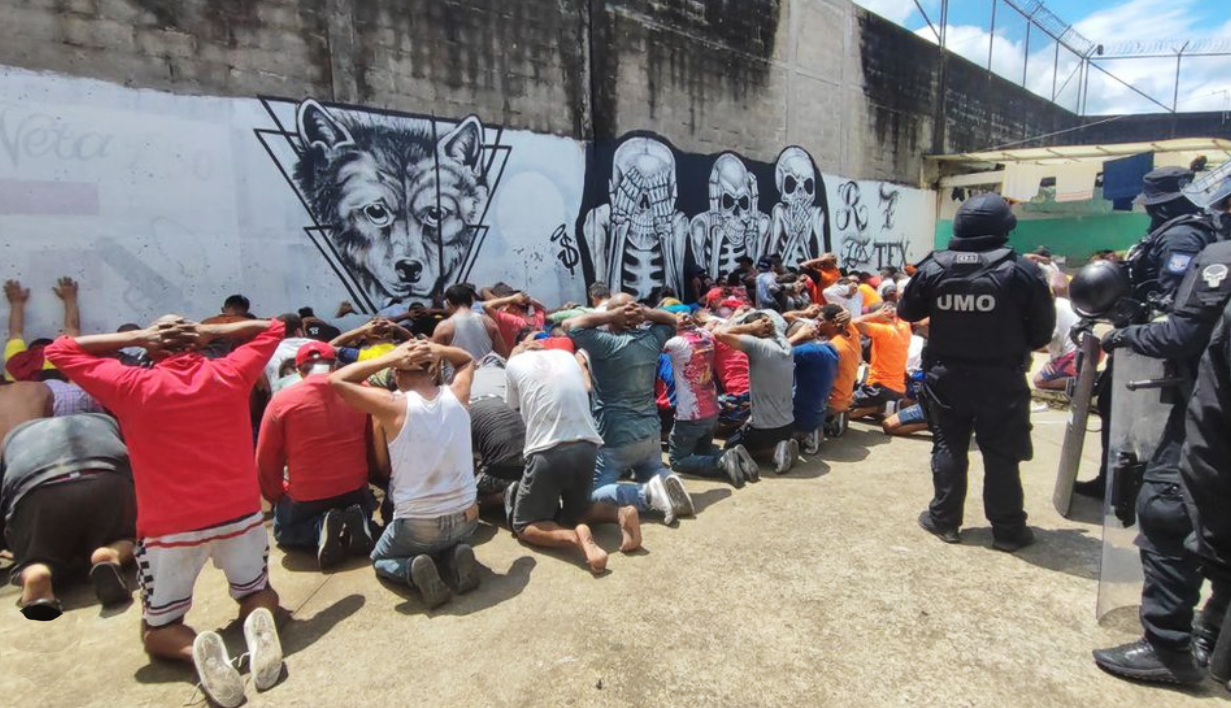On November 13, 2022, five spokesmen for criminal organizations announced from different prisons a peace agreement in response to the extreme drug violence in Ecuador. They did so through videos recorded in a communications format that mimics the current government’s presidential pronouncements. Short messages of approximately two minutes, without much explanation or justification and produced to circulate in social networks. In the images, the inmates look directly into the camera. The visual composition is corporate and the framing is political. A full-length shot shows the representative of each organization surrounded by dozens of inmates. The sound is relatively good and the tone of voice is respectful, even conciliatory. The shots could well be part of an advertising campaign made for a company or a political party; however, they are video messages made by ultra-violent prison gangs that the Ecuadorian state not only tolerated but encouraged in prisons in order to produce police intelligence on drug trafficking and related crimes.
The statements are directed at the government and the citizenry. In one of the videos, the spokesman prefixes the acronym GDO before naming the organizations that signed the peace agreement. GDO stands for organized crime group, a police category used to classify criminal networks associated with illegal economies.
Why is it in the inmates’ interest to call themselves GDO? Since 2019, the Ecuadorian prison is just another service of the National Police and the prison population is the most important source of police intelligence. Being considered GDO is vital for inmates because it allows them to negotiate privileges and capabilities such as, for example, requesting transfers, self-segregating inwards, or entering prohibited objects into incarceration centers.
In exchange, the police receive information on the logistical functioning of illegal drug markets in the country. It is worth noting that drug seizures are the most important indicator in the war against drug trafficking led by Washington. In this context, by affirming that the war is not against the state, the GDOs are reminding the government that organized crime needs state power to be lucrative and that they are not seeking to destabilize the regime, a hypothesis insistently suggested by the authorities responsible for the security and the president of the Republic himself.
Spokesmen also deny that their criminal networks are responsible for the recent wave of murders, extortions, and kidnappings. They accuse an ‘opposing’ GDO of being the cause of the insecurity and violence. The GDO in question is the largest in the country and the closest to the police work in prisons; in fact, it grew hand in hand with the penitentiary police intelligence unit.
It is common for criminal power and state power to feed off each other in societies where organized crime exercises informal sovereignty over populations historically abandoned by the state. The problem in the Ecuadorian case is that the government has little political power over police and security policy. In fact, the government is increasingly dependent on the police to manage social problems such as unemployment, and democratic dissent such as protests. This prevents it from dismantling the model of clandestine exchange and cooperation between the police apparatus and organized crime.
The videos also ask citizens to report to the Attorney General’s Office if they are victims of “vacunas” (vaccinations) – a word used in Latin America to refer to different extortion practices in areas where state power has limited capacity or is perceived negatively. Spokesmen indicate that the GDOs are not behind the collection of “vacunas” and say they are willing to collaborate with the justice system to identify the culprits.
Extortion is not a new phenomenon in Ecuador; there are testimonies of extortion that record practices of this nature decades ago, both among small and medium urban merchants and among farmers and rural entrepreneurs. What is new is the type of extortion to which citizens are currently subjected and its relation to prison.
Prison extortion in Ecuador is known as pawning. Being pawned implies that the person living behind bars becomes collateral or a pledge of a debt created by a group of inmates in an arbitrary manner. Pawned people must repay the debt within a certain period of time, usually by borrowing money from their families. This form of “vacuna” is neither an informal tax nor a forced protective service, it is the reduction of prisoner life to the predatory extraction of financial resources.
In the mid-2000s, pawning was outlawed by the inmates themselves as part of a pacification process. However, this practice has reappeared, sometimes under other names, since the prison crisis began and, in the last year, has spread to the streets of the most populous cities.
The GDOs speaking of “vacunas” in their peace pronouncement is relevant for two reasons. On the one hand, these organizations know that it is impossible to control extortion practices if they are not part of concrete processes of building criminal sovereignty, where extortion is reinterpreted as a service to the community and operates as a form of informal taxation.
On the other hand, it is evident that criminal networks perceive the growing rejection of citizens. This has not always been the case; several groups linked to drug trafficking had, and some still have, a certain legitimacy, especially in places where state sovereignty is in dispute, as is the case of the northern border.
In conclusion, it is worth noting that state power and criminal power in Ecuador co-produce, juxtapose, and increasingly resemble each other. The government’s security strategy generates violence instead of reducing it. Recruiting GDO leaders as human sources of police intelligence was a mistake. This police intervention reorganized the cocaine market based on principles of snitching and revenge, creating conditions for the emergence of extreme drug violence.
Currently, criminal organizations not only control the streets but also control the narrative of insecurity. The police act reactively based on the information offered by criminal network leaders. Unfortunately, the government does not seem at all interested in changing its “iron fist” policy.
*Translated from Spanish by Janaína Ruviaro da Silva












